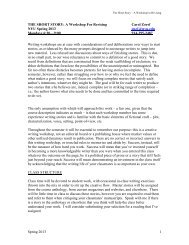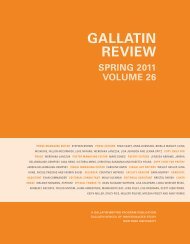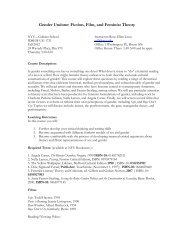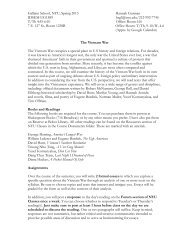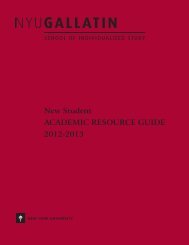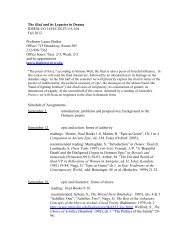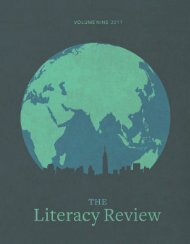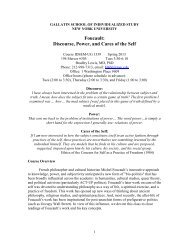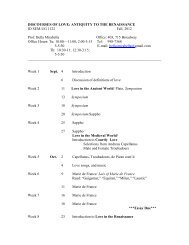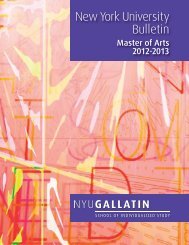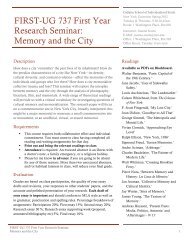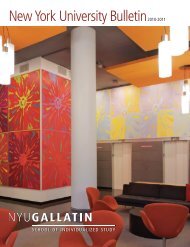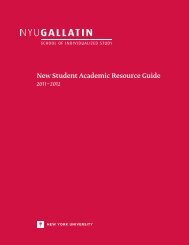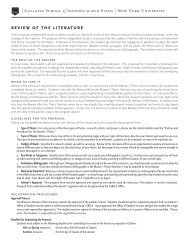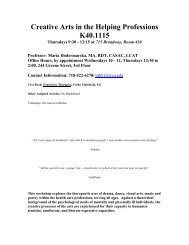Philosophy of Healthcare: An Interdisciplinary Approach
Philosophy of Healthcare: An Interdisciplinary Approach
Philosophy of Healthcare: An Interdisciplinary Approach
You also want an ePaper? Increase the reach of your titles
YUMPU automatically turns print PDFs into web optimized ePapers that Google loves.
Overview<br />
<strong>Philosophy</strong> <strong>of</strong> <strong>Healthcare</strong>:<br />
<strong>An</strong> <strong>Interdisciplinary</strong> <strong>Approach</strong><br />
Course IDSEM-UG 1294 Spring 2012<br />
Tues 9:30-12:15 194 Mercer #301<br />
Bradley Lewis, MD, PhD<br />
Phone: 212-998-7313 Email: bl466@nyu.edu<br />
Office: 1 Washington Place, #609<br />
Office hours (please schedule in advance):<br />
Tues (2:00 to 3:30), Thursday (2:00 to 3:30), and Friday (1:00 to 3:00)<br />
This course considers broad theoretical and philosophical issues in U.S.<br />
healthcare. We unpack the underlying concepts and principles that organize<br />
contemporary medical research, practice, and education. We look at the problems with<br />
today’s dominant models <strong>of</strong> medicine and the possibilities <strong>of</strong> alternative conceptual<br />
frames. We also consider how much the contemporary “healthcare crisis” comes from<br />
cultural and conceptual issues as much as the more obvious financial and administrative<br />
problems. Our inquiry will be an interdisciplinary approach that draws from medicine,<br />
philosophy, history, psychology, literary theory, anthropology, sociology, gender studies,<br />
disability studies, cultural studies, poetry, drama, and documentary.<br />
Texts<br />
W;t, Margaret Edson<br />
Necessary Losses, Judith Viorst<br />
The Spirit Catches You and You Fall Down, <strong>An</strong>ne Fadiman<br />
Biomedicalization, Adele Clarke, et al<br />
My Body Politic: A Memoir, Simi Linton<br />
SPRING 2012 CALENDAR<br />
Spring classes begin Monday, January 23<br />
Holiday: Presidents' Day Monday, February 20<br />
Midterm grades due Friday, March 9<br />
Spring recess (university <strong>of</strong>fices<br />
remain open)<br />
Monday, March 12 - Saturday, March 17<br />
Spring classes end Monday, May 7<br />
Reading day Tuesday, May 8<br />
Final exam week Wednesday, May 9 - Tuesday, May 15<br />
Final grades due Wednesday, May 16<br />
NYU Commencement Wednesday, May 16<br />
Gallatin Graduation Thursday, May 17<br />
1
Class Schedule<br />
1.) Jan 24 —Introduction<br />
In Class:<br />
Donne: “Death be not proud”<br />
W;t (start)<br />
2.) Jan 31—Biomedical Model<br />
Flexner: Medical Education in the U.S.<br />
Reiser: Becoming a Doctor<br />
Edson: W;t<br />
In Class: W;t (finish)<br />
Campo: “Technology and Medicine”<br />
3.) Feb 7—Philosophical, Phenomenological, and Cultural Reflection<br />
Leder: A Tale <strong>of</strong> Two Bodies:<br />
Marcum: Reflections on Humanizing Biomedicine<br />
Egnew: Suffering, Meaning, and Healing: Challenges <strong>of</strong> Contemporary<br />
Medicine<br />
Gaines and Davis-Floyd: Biomedicine<br />
4.) Feb 14—Psychoanalysis<br />
Viorst: Necessary Losses Pt I, II, IV<br />
5.) Feb 21—Reform Efforts from 1970’s: Biopsychosocial Model, Patient-Centered Care,<br />
Family Practice, and Hospice<br />
Engel: The Need for a New Medical Model: A Challenge for Biomedicine<br />
Cassel: The Nature <strong>of</strong> Suffering and the Goals <strong>of</strong> Medicine<br />
McWhinney: Are we on the brink <strong>of</strong> a major transformation <strong>of</strong> clinical method?<br />
Stephens: Family Medicine as Counterculture<br />
Garces-Foley: Buddhism, Hospice, and the American Way <strong>of</strong> Dying<br />
In Class:<br />
Bill Moyers: Dying (Hospice Excerpt)<br />
Marcus Welby Pilot: A Matter <strong>of</strong> Humanities (selection)<br />
6.) Feb 28—Contemporary Struggles with Biomedicine: Medical Humanities,<br />
Narrative medicine, PCMH, and Alternative Health<br />
Lewis: Narrative Medicine and Health Care Reform<br />
2
Charon: Narrative and Medicine<br />
Rogers: Assembling PCMH—The Care Principles<br />
Rogers: The PCMH Movement—Promise and Peril for Family Medicine<br />
Easthope: Alternative Medicine<br />
In Class: PCMH video<br />
Continuum for Health and Healing Practice Website<br />
http://www.healthandhealingny.org/center/about.asp<br />
7.) March 6—<strong>Philosophy</strong> and Alternative Medicine<br />
Davis-Floyd: Holistic Model <strong>of</strong> Health<br />
In Class Visitors:<br />
Scott Von and Julie Von from the New Clinic<br />
http://www.newclinic.org/<br />
***Turn in first paper Thurs 8 th (12 Noon my box)***<br />
March 13 SPRING BREAK<br />
8.) Mar 20—Cross-Cultural Encounters<br />
Fadiman: The Spirit Catches You and You Fall Down<br />
Kleinman: Culture, Illness and Care<br />
9.) March 27—Gender Studies<br />
Ratcliff: Women and Health: Power, Technology, Inequality and Conflict in a<br />
Gendered World excerpts<br />
Our Bodies, Our Selves excerpts from first edition<br />
Davis-Floyd: The Technocratic Body: American Childbirth as Cultural<br />
Expression<br />
Passau-Buck: “Caring vs. Curing” in Socialization, Sexism, and Stereotyping:<br />
Women’s Issues in Nursing<br />
Kleinman, Hanna: Catastrophe, Caregiving and Today’s Biomedicine<br />
In Class: Business <strong>of</strong> Being Born<br />
10.) April 3—Medical Sociology/Public Health<br />
Farmer: On Suffering and Structural Violence: A View from Below<br />
WHO Report 1995: Bridging the Gaps<br />
McKinlay and McKinlay: Medical Measures and the Decline <strong>of</strong> Mortality<br />
Conrad and Leiter: Medicalization, Markets, and Consumers<br />
Weitz: Expense <strong>of</strong> <strong>Healthcare</strong><br />
3
Gawande: The Cost Conundrum<br />
Starfield: Is U.S. Health Really the Best in the World?<br />
In Class: Campo: “Ten Patients and <strong>An</strong>other”<br />
11.) April 10— Biomedicalization, Cultural Studies, and Science Studies<br />
<strong>An</strong>gell: Excess in the Pharmaceutical Industry<br />
Sismondo: Ghost Management<br />
Lewis: High Theory/Mass Markets: Newsweek Magazine and the Circuits <strong>of</strong><br />
Medical Culture<br />
Clark et al: Biomedicalization Chapter 1<br />
Clark et al: Biomedicalization Chapter 3<br />
In class: Big Bucks, Big Pharma<br />
Rx for Survival: A Global Health Challenge (selections)<br />
12.) April 17—Biomedicalization and Global Health<br />
Biomedicalization: Body as Image<br />
Biomedicalization: Making <strong>of</strong> Viagra<br />
Biomedicalization: Breast Cancer<br />
Lewis: The New Global Health Movement: Rx for the World?<br />
Eckersly: Is Modern Western Culture a Health Hazard<br />
Eckersly: A New World View Struggles to Emerge<br />
In Class: Examined Life—Sunara Taylor and Judith Butler<br />
Start Sound and Fury<br />
13.) April 24— Disability Studies<br />
Davis: Constructing Normalcy<br />
Linton: Reassigning Meaning<br />
Garland-Thomson: Integrating Disability, Transforming Feminist Theory<br />
Edwards: Hearing Aids are Not Deaf<br />
Wade: “I Am Not One <strong>of</strong> the” and “Cripple Lullaby”<br />
In Class: Finish Sound and Fury<br />
Vital Signs: Crip Culture Talks Back (pt 1—Wade and Fries)<br />
Gimp-The Documentary (trailer)<br />
Linton lecture: Disability in 21st Century America: Psychological,<br />
Social, and Political Meanings (start)<br />
14.) May 1— My Body Politic<br />
Couser: Disability, Life Narrative, and Representation<br />
4
Linton: My Body Politic: A Memoir<br />
In class:<br />
Linton: Disability in 21st Century America: Psychological,<br />
Social, and Political Meanings (finish)<br />
***Final paper due on Friday May 4 th (5 PM my <strong>of</strong>fice)***<br />
Course Requirements<br />
Grades are based on three parts: attendance/participation (20%) and 2 papers<br />
(40% each). Late papers are graded down. There will be an opportunity to rewrite the<br />
first paper if you desire. The attendance/participation grade is composed <strong>of</strong> weekly class<br />
attendance and participation.<br />
On the days we do not have a film or guest lecturer, class will begin with a short<br />
lecture on the material for that week. We then move to round robin class discussion<br />
initiated by your selections from the material. To prepare for this part <strong>of</strong> the class please<br />
type a quote from each week’s readings which you have comments or questions (include<br />
page numbers so we can find your quotes). We will then go around the class reading and<br />
discussing the quotes selected. Your quotes for each half <strong>of</strong> the class are turned in with<br />
your papers.<br />
The papers are 7 pages type written, double spaced. Please use the material from<br />
the class to develop the topic question I hand out. Back up your thesis with arguments<br />
and examples from the class readings (include internal citations with page numbers and a<br />
reference list at the end). A good paper demonstrates that you have integrated the<br />
material from the class discussions and readings and can use it to analyze your topic. Use<br />
the bulk <strong>of</strong> your energy reading closely and thinking seriously about the materials you<br />
have (rather than doing outside research). Also, be sure and give your paper a title.<br />
The grading scale for the class will be as follows: 93-100% (A) 90-92 (A-), 87-89<br />
(B+), 83-86 (B), 80-82 (B-), 77-79 (C+), 70-76 (C), 63-69 (D), and below (F).<br />
Paper Topic One:<br />
Based on our research, what are your reflections on humanizing healthcare?<br />
Paper Topic Two:<br />
The phrase “crisis in healthcare” generally refers to fiscal and administrative<br />
issues <strong>of</strong> escalating costs, insurance cut backs, and rising numbers <strong>of</strong> uninsured patients.<br />
Considering the social, cultural, and political issues covered in the second half <strong>of</strong> class,<br />
how do you see the “crisis in healthcare?”<br />
5



